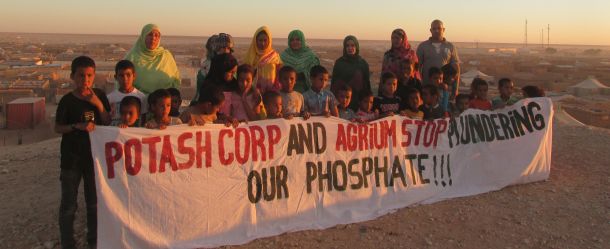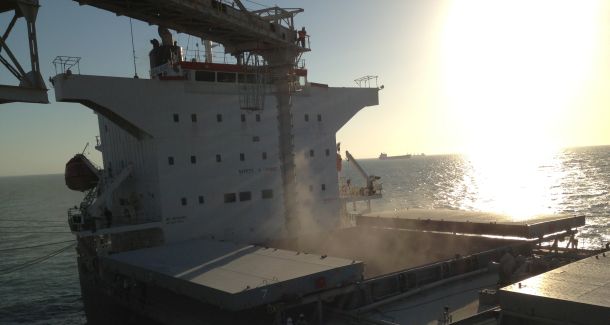
The text below is a press release from the Canadian group SHARE. PotashCorp was in 2015 the company in the world that took in most phosphates from occupied Western Sahara, a report from Western Sahara Resource Watch revealed.
Shareholders to present human rights proposal at Potash Corporation general meeting
Press release, May 5, 2016
Two institutional shareholders of Potash Corporation (TSX:POT) will present a shareholder proposal at the company’s annual meeting Tuesday May 10th, asking the company to commission and make public an independent assessment of its human rights responsibilities in relation to sourcing phosphate rock from Western Sahara.
Potash Corporation is now the world’s largest importer of phosphate rock from the non-self-governing territory of Western Sahara, part of which is currently controlled by Morocco. Morocco’s claim of sovereignty over the Western Sahara is not recognized by the International Court of Justice or the United Nations, and serious human rights violations have been reported in the territory. It is sometimes called “Africa’s last colony”.
The Congregation of the Sisters of Mercy of Newfoundland and OceanRock Investments Inc. (Meritas Jantzi Social Index® Fund) worked with the Shareholder Association for Research and Education (SHARE) to file the proposal. This is the second year shareholders have filed this resolution at the company.
“Since 2015 the legal and reputational risks related to extraction of resources from Western Sahara have steadily grown,” said Fred Pinto, CEO of OceanRock Investments Inc. “Conducting an assessment of the company’s actual and potential impacts is a long-overdue first step in human rights due diligence. As the international community’s attention is increasingly drawn to the conflict, this assessment is even more critical for shareholders.”
The company’s Board recommends a vote against the proposal, saying that “a distinction must be made between political issues and the legal and other responsibilities placed on companies operating in the region or having business relations with companies operating in the region.”
“There is a difference between a political approach – which Potash is not being asked to take – and a business approach, which any public company working in the Western Sahara is obliged to take,” said Sister Sheila O’Dea of the Congregation of the Sisters of Mercy of Newfoundland. “The question is not ‘how can Potash fix the situation in the Western Sahara?’ but ‘what are the actual and potential human rights impacts of Potash’s business operations on the Sahrawi people?’”
“Potash says it has done its due diligence, but no reports by independent parties have been made publicly available,” said Kevin Thomas, Director of Shareholder Engagement for SHARE. “The company has indicated that it is relying on two undisclosed reports prepared for the Moroccan state-owned company from which Potash purchases phosphate rock, as well as on visits by company officials. That’s neither independent nor transparent.”
The company’s Annual Meeting will be held in Saskatoon at 3:30pm local time on May 10.
For more information or to arrange interviews, please contact:
Kevin Thomas
Director, Shareholder Engagement
Shareholder Association for Research & Education
Email: kthomas@share.ca Phone: 416-992-5392
The full text of the proposal is available at: http://bit.ly/24qYA5h
New report: Western Sahara phosphate trade halved
The export of phosphate rock from occupied Western Sahara has never been lower than in 2019. This is revealed in the new WSRW report P for Plunder, published today.
New report on Western Sahara phosphate industry out now
Morocco shipped 1.93 million tonnes of phosphate out of occupied Western Sahara in 2018, worth an estimated $164 million, new report shows. Here is all you need to know about the volume, values, vessels and clients.
US imports of Western Sahara conflict rock to end
A landmark decision has been made. The large-scale exports of conflict phosphates from occupied Western Sahara to the United States will stop this year.
Key player quits dirty Western Sahara phosphate game
One of the most important companies in the controversial phosphate business in Western Sahara is ending its involvement. Innophos Holding's exit might lead to the US totally terminating its decade-long imports from the occupied territory.



